
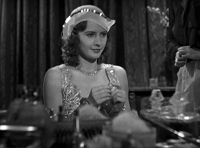 |
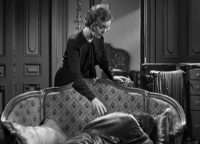 |
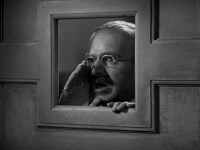 |
| Kitty Lane … Barbara Stanwyck |
Aunt Dot … Zasu Pitts |
Fred … Lucien Littlefield |
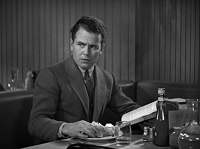 |
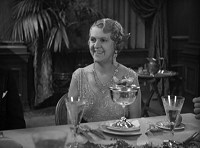 |
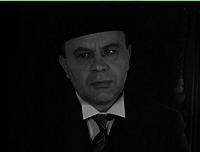 |
| David Livingston … Regis Toomey |
Helen Livingston … Clara Blandick |
Judge Forbes … Oscar Apfel |
Proof That It’s Pre-Code
- Upfront, it’s important to know that the surviving copies of this film are from a 1938 re-edit, which means that this version of the film has been approved by the Motion Picture Production Code Association. However, there’s still some content here that’s important to the plot that had to get through the censors, and I’ll briefly touch on what remains.
- On the experience of womanhood via Kitty: “I could cuss when I was six and say ‘no’ when I was fourteen!”
- It’s kind of stunning that this part survived, but check out Kitty’s vocabulary list:
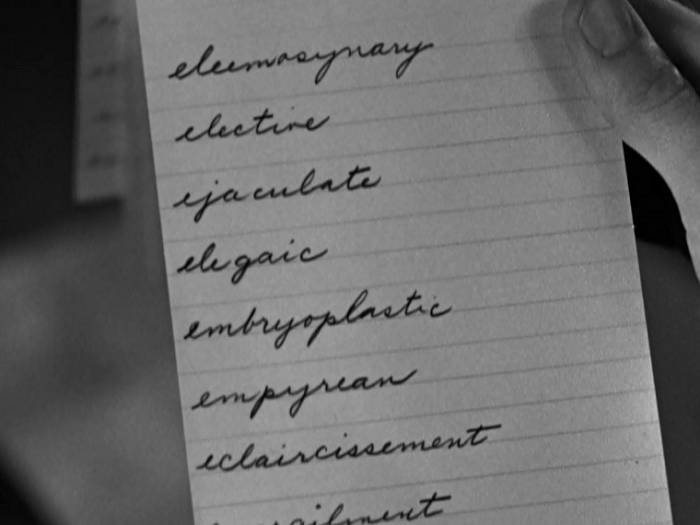
Almost did a spit take on word #3.
- There’s the barest hint that a case of motherly love gone to extremes may be perverse. Barest. Hint.
- Our heroine ends up getting with a lot of divorced men, though we only see the subtext of that necessary which is necessary to propel the plot.
Shopworn: Don’t Mind the Price Tags
Barbara Stanwyck is gorgeous. Don’t let anyone ever say I thought otherwise. Here in Shopworn, a drama of the most contrived kind, she radiates, allowed to play both young and old and in both arenas given the best of fashions to sashay around in.
Unfortunately, the same quality is severely lacking in the screenplay. Trying to tackle gossip and social issues in the same manner as fare like Hot Saturday while emphasizing the cruel horrible world that the early 1930s seemed to embody, Shopworn becomes sadistic in its saga. This isn’t the story of a girl overcoming the odds, this is the story of a world out to ruin a woman no matter what the cost.
Let’s start at the beginning, which, besides being a very good place to start, kicks things off with a quite literal bang. There’s a bunch of men who are in the process of blowing up a mountain, and for some unfortunate reason, a man is running around right above the explosion. He gets buried, and his daughter is called for; this is Kitty. After losing her mother, this is strike number 2 against her luck.
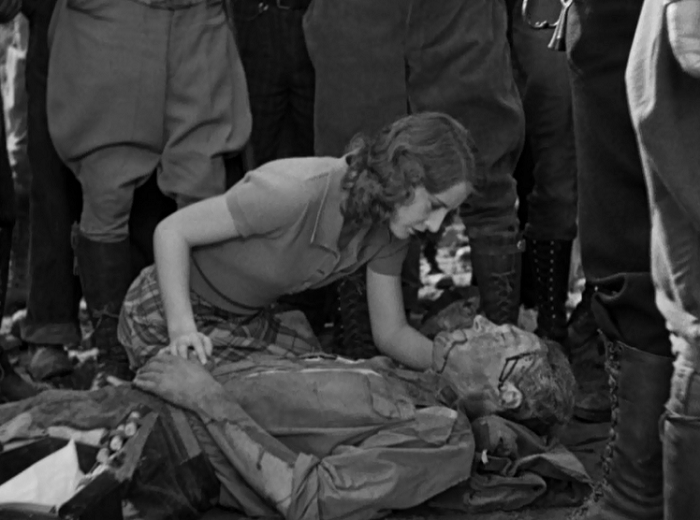
“Dad? Dad! Don’t worry! We’ll put some balloons in your lungs, that’ll fix things but quick!”
This introduction is fairly lengthy for a movie that clocks in at 68 minutes, but sets the film’s themes up early.
- It shows the other workers to be sympathetic at the man’s passing, but indifferent to Kitty’s grief. Besides the lackadaisical doctor who walks his way to the avalanche site, one worker picks up the dead man’s sandwich and takes a big bite out of it! And:
- Something happens that we’re asked to swallow without an explanation. Why was her dad running around an explosion site, which was labeled ‘the biggest explosion in the world’? Failing that, why does the doctor saunter over with nary a care despite the severity of the injury? Because shit happens, and it’s shitty, that’s why.
Since Kitty’s life is pain and turmoil personified, she moves in with her aunt and abusive uncle Fred. She becomes a waitress in Fred’s on-campus hamburger joint, while her uncle constantly thinks the worst of her during his downtime between trying to bilk his customers. Kitty flirts with the occasional patron, but her innocence is always mistaken by others as an act (or, at least in this cut of the film, seems to be).
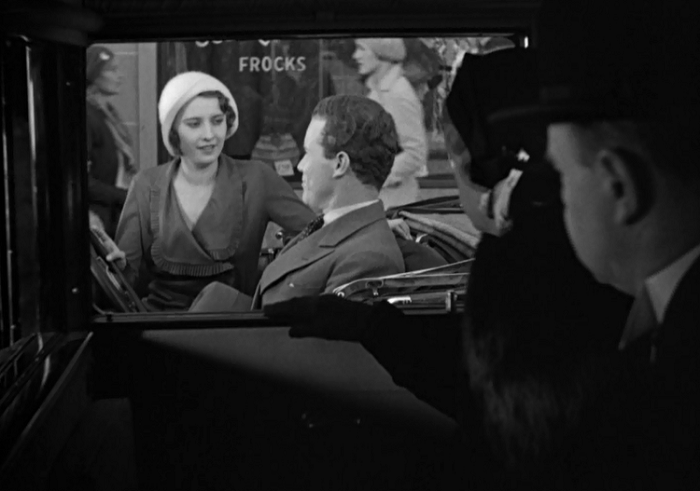
But, don’t worry, some perverse version of love is around the corner!
When she meets David, a serious law student, he dresses her down. Not because she was flirting with a group of customers, but because if she didn’t want them to hit on her, she would have a way of getting them not to flirt with her. You can tell he’s a catch by the way he insults her, implies that she’s a whore, and then insinuates that it’s always a woman’s fault if she attracts unwanted attention.
A word about actor Regis Toomey: he’s awful. (And yes, there is probably a person out there with a Regis Toomey blog ready to make me eat my words, but I say bring ’em on.) He’s a big slab of meat, a solid-B leading man whose job in the movie is to be snobbish then smitten, but he remains so cardboard he’s barely present. He may as well just hold signs in front of him denoting emotions for the other actors to react to– “HAPPY”, “SAD”, “CONFUSED”. Stanwyck’s a professional, she could handle it.
Toomis is certainly under-served by the character of David, whom Kitty seems to fall for simply for the virtue of being a bigger jerk than most of the other men in her life. Considering the company… wow.
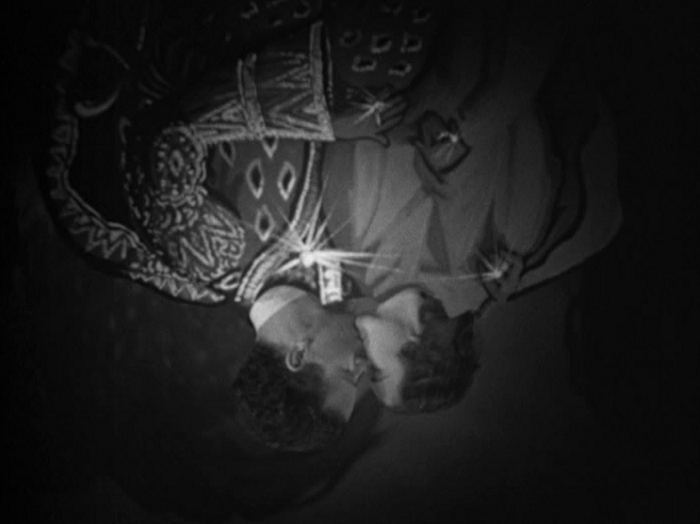
Vomit. So much vomit. Streaming out of my eyes.
David’s tended to by his doting mother, Helen, and her partner, a judge named Forbes. They represent a duo of the worst society has to offer– one has money, the other power, and neither have scruples. Finding that David is dating, gasp, a waitress, she freaks out and the two plot to separate the couple. At first feigning acceptance, the judge uses some unsourced gossip to get Kitty thrown in jail for public indecency. David, led to believe that she was using him, storms off.
In case you’re thinking that the comically nasty portrayal of the rich is to give the film a socialist vibe, hold onto your horses. The rich get away with being evil more handily simply because they have the power and money to exert it, but everyone is complacent in a cold, unfeeling world. Uncle Fred and his stinginess does just as much damage as Helen Livingston, and the matriarch in the woman’s prison always chooses punishment over compassion. Every character is petty and cruel, and, sadly, this may just have been how the world seemed at the time it was made.
But that doesn’t mean I have to happy to watch it. Kitty serves her time, and just when you thought the movie was going to stop being goofy, we’re treated to a montage. Kitty, who was a waitress, who in this movie has expressed absolutely no ambition outside of that, has within the space of a minute become a nationally famous theater star.
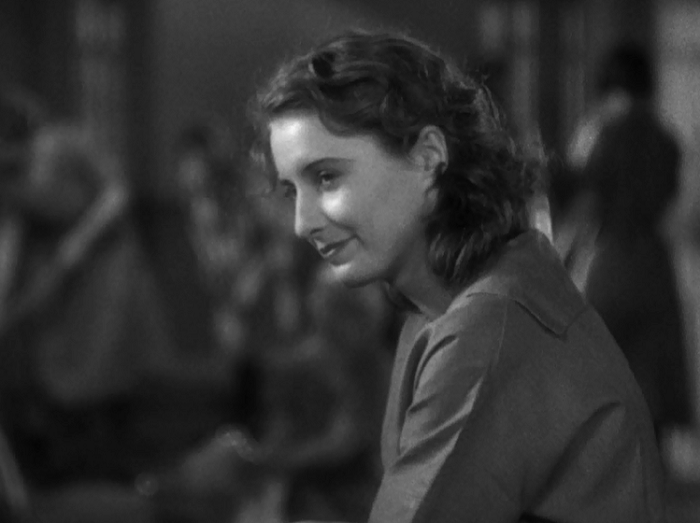
Biting her tongue, surviving.
I’m going to wager that this section received some cuts, since we’re also told suddenly that to get to the top she had to do things she wasn’t proud of, and there are brief glimpses of headlines that indicate that she may have had a hand in a suicide and a few divorces. David reenters her life, and she tells him off, divulging this information and being downright scary in her anger.
Things can’t end that way, not even in Pre-Code films, and the movie goes to breakneck speed in order to get us to a happy ending. Kitty and David reunite again, and decide to run away. Kitty finally proves to Helen that she really does care about David, and she gives them her blessing.
Shopworn as a film is kind of cruel and joyless. Director Nick Grinde, who had a fairly undistinguished career, gets some really good looking shots in, but the flourishes never seem to be in service of the narrative. They’re pretty, but they sit there. The pacing of the film suffers, and the story has a decided lack of tension.
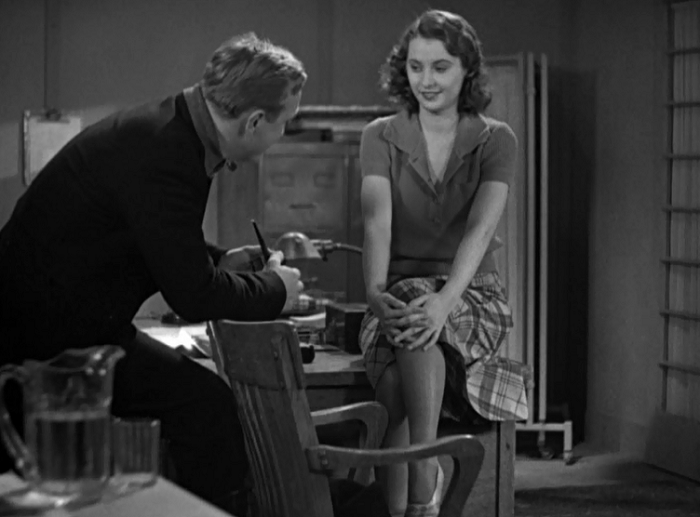
I was going to post a more relevant screen shot, but, forget it, more pictures of Stanwyck.
Worse, the drive is paltry: what does Stanwyck need to overcome to reach her happy ending? Placating one old lady, who she barely meets until their last scene, never seems impossible. Because the film’s world is so cruel, we know there will be pity. It’s obvious from the get-go: the movie has no guts.
The only worthy flourish is in Stanwyck’s performance, who nails this role. Her best scene comes at the transition from naivete to wizened woman, when Judge Forbes comes to try and bribe her. In one swift move of instant defiance, she flings the money in his face, marches outside and grabs the waiting policeman: “Come in, copper, and earn your pay!” Her dynamism is the only thing that will keep you awake.
Shopworn is a piece of crap. If it weren’t for Barbara Stanwyck here, my entire review probably would have consisted of :P.
Gallery
Here are some extra screenshots I took. Click on any picture to enlarge!
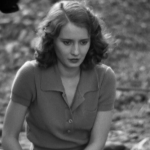

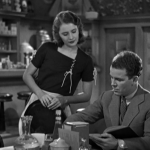
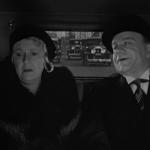
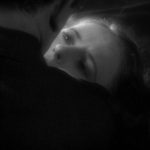
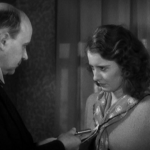
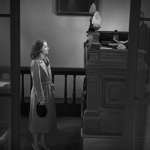
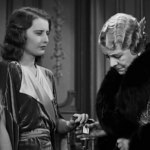
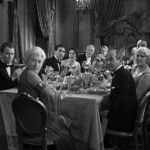
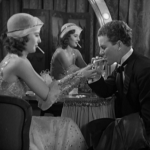
Trivia & Links
- Mordaunt Hall for the New York Times rips this one to shreds, and actually has fun with it. Here’s a choice quote:
It is a case of a selfish mother opposing her son’s marriage to a waitress, and as it is unfurled is a lot of fuss about nothing.
- If you want more screenshots, check out DVD Beaver.
- Noir and Chick Flicks talk about Clara Blandick, who is most famous for her role as Auntie Em in The Wizard of Oz.
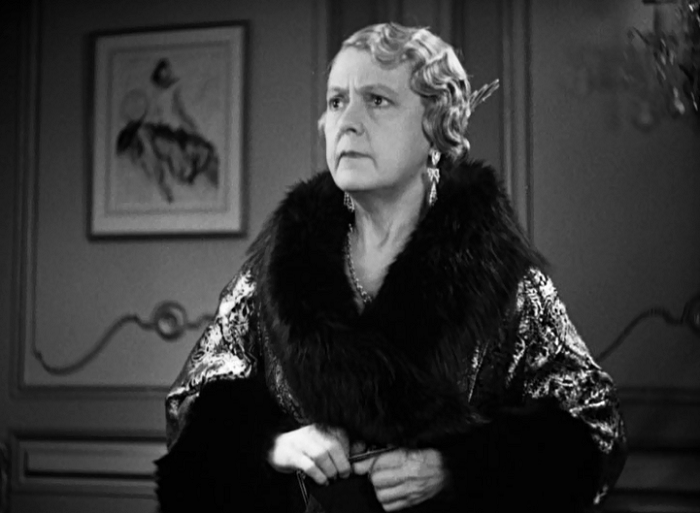
“Auntie Em! You have weird feelings about your son! It’s weird!”
- Will McKinley at Cinematically Insane talks about the Columbia Pre-Code Collection that this film is a part of. He also questions whether or not Pre-Code is sufficiently pro-feminist in consideration of the collection, since so many of them are about women being ground up and used, or if the bubblegum fantasy of the code era are better. I fall on the pre-Code side (naturally) since mostly what the Production Code does is remove agency from the female characters. After the Code is enforced, the traditional family is placed above all else, and women are put in their place. While dreamier men may rescue them after 1934, all of them will still end up in the kitchen.
- For all of my ventilating about this picture, I don’t think anything I said was as brilliantly nasty as this bon mot from Mondo 70:
Movie fans probably should find a film like it to watch sometime, if only to remind themselves that not everything in the Pre-Code era was scintillating, relevant or even interesting.
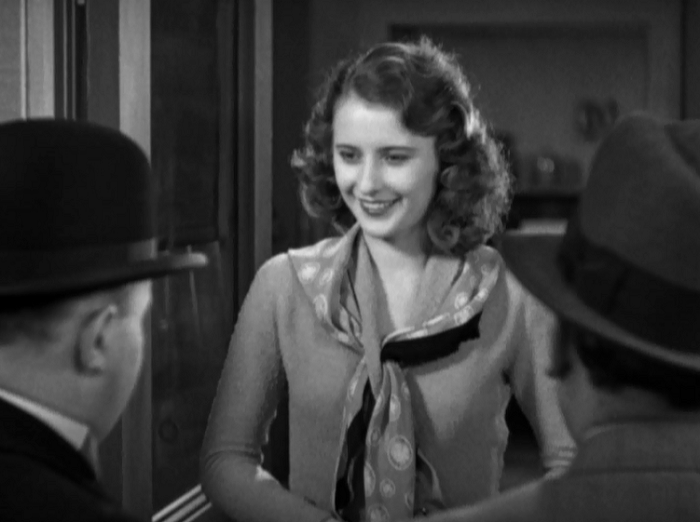
I can’t go without leaving you some Stanwyck.
Awards, Accolades & Availability
- This film appeared in the Wikipedia List of Pre-Code Films.
- This film is available in the Columbia Pre-Code Collection. That can be picked up on Amazon, and can be rented from Classicflix.
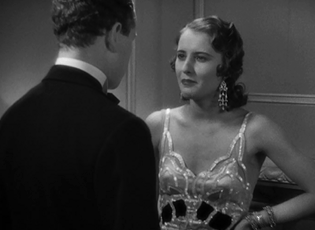 |
Comment below or join our email subscription list on the sidebar!Home | All of Our Reviews | What is Pre-Code? |
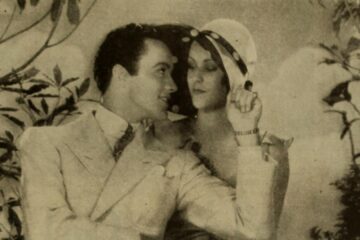


17 Comments
justjack · July 9, 2013 at 2:43 pm
Danny, I suppose it’s worth noting that in my earliest Hardy Boy books (from the late 20’s and early 30’s), “ejaculate” is used when someone says something in an excited, manic way. “So now we know where to find the missing coins,!” Joe Hardy ejaculated.
Andrew · July 9, 2013 at 4:19 pm
Correct. Even Edgar Allan Poe was using that word that way a hundred years earlier.
Danny · July 9, 2013 at 9:28 pm
I see where you’re both coming from, but considering there’s a whole conversation about the word that has a number of nods and winks, I’m liable to leave it in for now. I got the film from ClassicFlix, so I’ll put it back in my queue so I can rewatch the scene and see if my imagination was just getting away with itself or not!
Andrew · July 9, 2013 at 4:21 pm
You can almost never go wrong with Pre-Code Stanwyck! Really looking forward to this month’s reviews. 🙂
Danny · July 9, 2013 at 9:04 pm
Almost never is right! Luckily, this is the only complete dud of the lot from what I’ve seen so far. 🙂
Page (@ACaryGrantFan) · July 9, 2013 at 10:35 pm
I certainly can’t argue about Barbara’s beauty and you’ve provided such gorgeous screenshots of her here. Loved the fashions in this film and Barbara did her best with the screenplay as you’ve touched upon.
I laughed at your Toomey comments and someone having a Toomey fan blog. If nobody has ever gone after me for giving Shirley Temple such a hard time in fun then I think you’ll be okay. ha ha
Also, there is just something about the title, Shopworn that always makes me think of Shopworm when I see it. Just bizarre! Oh, and that shopping list. *snorts
An enjoyable film and I really enjoyed your honest approach to reviewing it. Quite entertaining.
All the best!
Page
Danny · July 11, 2013 at 10:12 pm
Thanks Page! I’m surprised you got away with Temple bashing– I’d definitely avoid dark alleys for a while if I made fun of her. 🙂
justjack · July 10, 2013 at 4:46 am
I can just picture the producer standing in front of the censor with one of those “who, me?” looks and saying, “What? What? It’s a word! It’s a legitimate word! See? Franklin W. Dixon uses it!
brianpaige · July 12, 2013 at 3:36 pm
Am I the only one who remembers kinda liking this movie? I mean it was no classic or anything but I’ve seen worse. With that said, I am going to definitely agree 100% on the leading man efforts of one Regis Toomey. Oh man does this guy ever suck. He’s REALLY bad. Wanna know how horrible he is? My brother and I actively make fun of him whenever we see him in anything (aside from his inoffensive role in The Big Sleep as a cop). But if anyone else here wants to see early talkie acting at its absolute worst, check out Toomey in Alibi (1929). Oh man. He has a death scene that might be the single worst death scene ever.
Danny · July 12, 2013 at 5:33 pm
There are certainly worse moves out there, but the Production Code edit on this one makes it kind of a bear to get through. It’s not just Toomey though– pretty much everyone outside of Stanwyck here is given nothing to work with and nothing to show for it. I’ve seen the same story done better– by Stanwyck, no less.
shadowsandsatin · July 28, 2013 at 2:01 pm
Hi, Danny! Thank goodness you reviewed this one! After having this movie in my collection (not to mention a lobby card on my wall) for almost a year, I finally finished watching it this morning and practically broke my neck to try to find what others thought of it! I should’ve known you’d have given it the treatment. And was I relieved to see your sour-faced “DISLIKE”!! When I finished watching this, I just said, OH, BROTHER,” out loud. I couldn’t believe it. I was completely finished with it at the point when the screenplay offered the old chestnut of the other-side-of-the-tracks gal making the supreme sacrifice by acting like she’s been playing her fella all along. Geez, Camille anyone? Anyway, I loved your review, hated this movie. Blecch. (And I had no idea that was Auntie Em! We hardly knew ye.)
Danny · July 28, 2013 at 2:20 pm
Ha! Yeah, the stink of this one lingers, I’m afraid. I think the cuts do the film a disservice, but we have to take what we’re left with, a mishmash of improbable melodrama. The worst Stanwyck pre-Coder, easily.
Judy · July 11, 2014 at 2:54 am
I’ve just seen this and was dismayed by all the clumsy cuts – what’s left of the film make little sense. I suppose it’s too much to hope that someone will find the missing footage or an uncut print! I do suspect that it probably wasn’t a classic anyway, but there are a few good moments in there – I did like the whole opening, and the scene at a dinner party where it is shot as if each person’s glass or plate is speaking. But, yeah, it isn’t enough, and I’d have to agree with “dislike”.
I don’t have a Regis Toomey blog, but I don’t have any particular problem with him either – he’s pretty good in Wellman’s ‘Other Men’s Women’. Aunt Em annoyed me a lot more in this. Anyway, enjoyed dipping into your archives to read this great take on a disappointing Stanwyck movie (though she is great as ever).
Danny · July 15, 2014 at 9:29 pm
Yeah. I usually feel bad when I talk about movies that have been heavily edited and trying to judge them based on such, but in Shopworn you can kind of tell what’s missing, and I don’t think it would’ve changed the movie’s general emotional wonkiness that much. Thanks for coming by Judy! Don’t worry, though, I think this is pretty easily Stanwyck’s worst pre-Code.
Terence · February 8, 2015 at 5:39 am
You needn’t spit coffee over No. 3 of the vocabulary list. It isn’t necessarily as risque as you might think. In Catholic theology, ejaculation also refers to a very short recited prayer. And in grammar, it can also mean a one word exclamation, such as “ouch!” I doubt a good Catholic like Joe Breen would made much of an exclamation when he encountered ejaculation on the word list. I’m sure he heard it used often enough in Catholic school (albeit without the biological meaning.)
Danny · February 8, 2015 at 2:08 pm
Thanks for you comment. And thank you for allowing me to imagine Joe Breen saying the word ejaculate willy nilly. 🙂
Craig · July 13, 2021 at 8:52 pm
Just seen this. I agree with everything above, but still managed to enjoy it. I could be perverse but I am always interested in how and when Freudian psychology enters a movie. Mothers and sons!
Comments are closed.